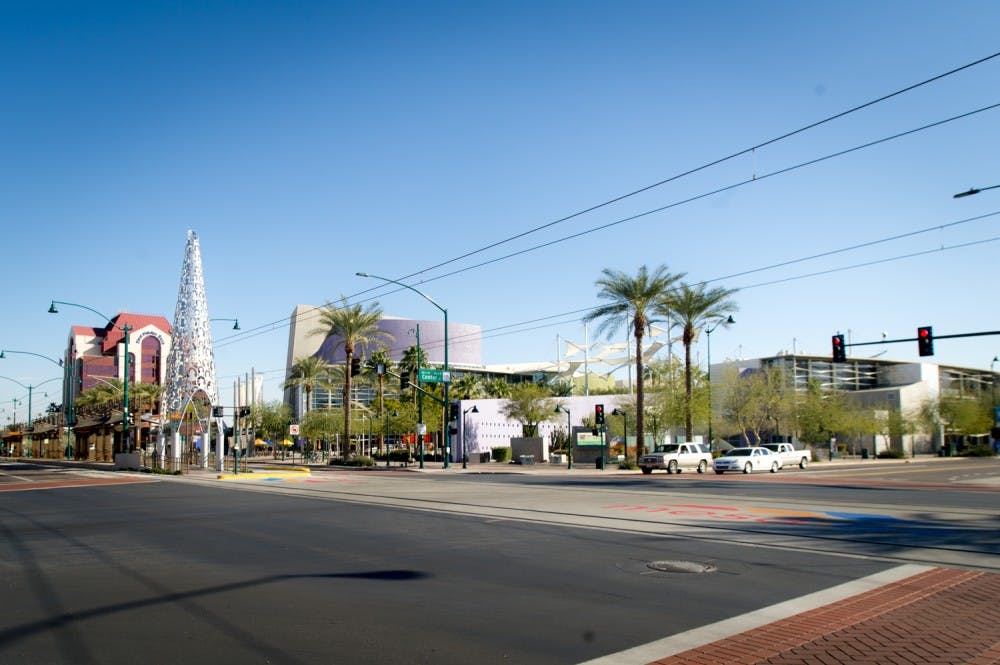ASU's potential expansion to downtown Mesa could bolster change for the community, but it has the capability to equally affect students and non-students.
On June 20, the Mesa City Council unanimously voted to put a sales tax increase proposal on the November ballot. If the proposal is approved by Mesa residents, not only would the ASU Mesa campus be able to begin construction, but change could also trickle down to the city's public safety sector.
If approved, the proposal would increase the city's sales tax by 0.4 percent, bringing it to 2.15 percent total.
The new revenue created from the sales tax hike would then go toward Mesa’s public safety and higher education initiatives.
What this could mean for ASU
Mesa resident James Taylor is in support of the proposal and believes the presence of the new ASU campus could benefit downtown Mesa.
“I think it’s only going to improve,” he said. “The culture, the shops, the economy, just being there is going to improve, because there’s more students and more people living around the area.”
However, some residents do not share Taylor's sentiments.
ASU business law and finance junior Rei Llazani said he believes continuous expansion could lead to an identity issue for the University.
“What I compare ASU to is a corporation,” he said. “Everything in life has its own identity, and the larger we become, the more difficult it is to keep our identity and be intact.”
Llazani acknowledged that ASU brands itself as an institution with large campuses filled with inclusivity and diversity. While this is the case, Llazani said he prefers a university with more specialization and smaller classes.
“When it comes to my classroom, and there’s more and more people, there’s less attention on me,” he said. “The attention is being divided.”
What this could mean for Mesa
Mesa Mayor John Giles said he believes bringing the school to Mesa could help the city where it needs it most.
While the school's presence would get significant funding from the sales tax increase, the majority of the new revenue is intended to help install new positions in local police and fire departments, he said.
“The proposal addresses the top two needs of our community,” he said. “First is public safety.”
Mesa Development and Sustainability Project Manager Jeff McVay has been a large proponent in ASU's expansion to downtown Mesa. He said Mesa's public safety could use additional funding, and a sales tax increase could bring that to fruition.
“What we’ve experienced is that our police have been stretched for a really long time,” he said. “We have a significant population center that is still growing, and we haven’t been expanding our public safety staffing and facilities to meet the growth that the city has had.”
A sales tax increase has the potential to be met with opposition in a traditionally conservative city. According to the Secretary of State's office, Republican voters outnumber Democratic voters approximately 7-to-5 in Maricopa County. However, Giles emphasized that the council prides itself on affordability.
Giles said a sales tax rate of 2.15 percent would put Mesa in the median when compared to other major Arizona cities.
McVay said Mesa residents have voted for sales tax increases in the past, notably in the "Quality of Life" sales tax, which funded public safety and the Mesa Arts Center in the '90s.
Giles said Mesa does not tax food, does not have a primary property tax and therefore remains below average in terms of taxation.
The expansion's mutual benefits
The extension of the Metro light rail in 2015 has already created a good opportunity for students to easily trek from Mesa to multiple ASU campuses, according to a report conducted by graduate students of ASU’s School of Geographical Sciences and Urban Planning.
According to the report, light rail access to the new ASU campus could provide downtown Mesa with more college students and bring in more businesses as a result.
Giles said the installation of a campus in downtown Mesa could have a positive economic effect on the city in the future.
“This will allow us to make more opportunities for higher education available to people in Mesa,” he said. “That’s going to help us create a better workforce and it’s going to be great for our economy.”
However, the matter will not be officially settled until it reaches the ballot box on Nov. 8.
“It’s in the voters’ hands now,” Giles said.
Reach the reporter at angel.n.mendoza@asu.edu or follow @angelnikolas96 on Twitter.
Like The State Press on Facebook and follow @statepress on Twitter.





